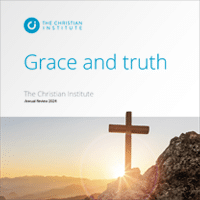
Grace and truth
Annual Review 2024
Welcome to our Annual Review 2024. I trust you will be greatly encouraged as we reflect on another year. We can give thanks to God for all the work He has enabled us to do.

When I joined The Christian Institute ten years ago it was this verse that resonated in my mind as I walked through the doors for the first time. Or more specifically, a portion of the verse: “[Jesus Christ] came from the Father, full of grace and truth”. It was my great desire to work somewhere that modelled “grace and truth” and to live them out in my own life.The Word became flesh and made his dwelling among us. We have seen his glory, the glory of the One and Only, who came from the Father, full of grace and truth. John 1:14 NIV
It is sad that so many people behave as though these two qualities operate on some kind of sliding scale or – even worse – are polar opposites. Truth without grace is of course a travesty. These days however, it seems that truth is more often the punching bag. To speak the truth, however gently or compassionately, however nuanced and full of context, is to risk accusations of being ‘ungracious’, even ‘hateful’.
Grace and truth are not opposed to one another and in need of reconciliation. They are not even in tension, as if to demonstrate more grace or more truth must somehow be at the expense of the other. We need them both in full – as we see in Jesus himself. John’s language here is reflecting Exodus 34:6-7 when God causes his glory to pass by Moses on Sinai and proclaims himself to be “abounding in love and faithfulness”.
A little later the Apostle says: “For the law was given through Moses; grace and truth came through Jesus Christ” (John 1:17). This is not to pit the Old Testament against the New, as if God exhibited no grace before the coming of Christ – far from it. God’s law is full of grace towards sinful creatures. It simply recognises that the Law had not fully revealed the glory of “the One and Only” in whom grace and truth meet in matchless harmony. On the cross the truth of the awful consequences of sin was met with the grace of a punishment borne by Christ.
Attempts to set grace and truth against one another are readily apparent in many areas of the Institute’s work. Gender ideology, sexual ethics, marriage and the sanctity of life are highly sensitive issues and must certainly be addressed with genuine compassion. Speaking the truth does not require rudeness or selfrighteousness. They are also areas where the biblical worldview stands in stark contrast to the cultural zeitgeist. We cannot water down the truth for fear of man or in the misguided belief that this is the gracious thing to do. ‘Grace’ without truth is not grace at all, it is merely empty sentimentality.
Cancel culture, the rise of abortion censorship zones and the cases of ‘Susan’ and Angus Cameron highlighted in this Review are all examples of attempts to undermine the truth with fake grace. We see it too when assisted suicide is presented as compassion and when demands for a new law on ‘conversion therapy’ seek to silence calls to repent.
Though this Annual Review deals with 2023, it is impossible to conclude without reflecting on the sad loss of my mentor, our late Director Colin Hart, in March 2024. Under God, his vision and gifts have shaped the Institute for nearly 35 years. In tribute, we are renaming our longrunning Autumn Lecture series after him. The first annual Colin Hart Lectures will take place in November 2024.
Motivated by his love for the Lord Jesus Christ and gratitude for what He had done at Calvary, Colin spoke up boldly and faithfully on all these issues and many more. We will continue to do the same and, by the Holy Spirit, do so full of grace and truth.

Welcome to our Annual Review 2024. I trust you will be greatly encouraged as we reflect on another year. We can give thanks to God for all the work He has enabled us to do.
By Ciarán Kelly, Director